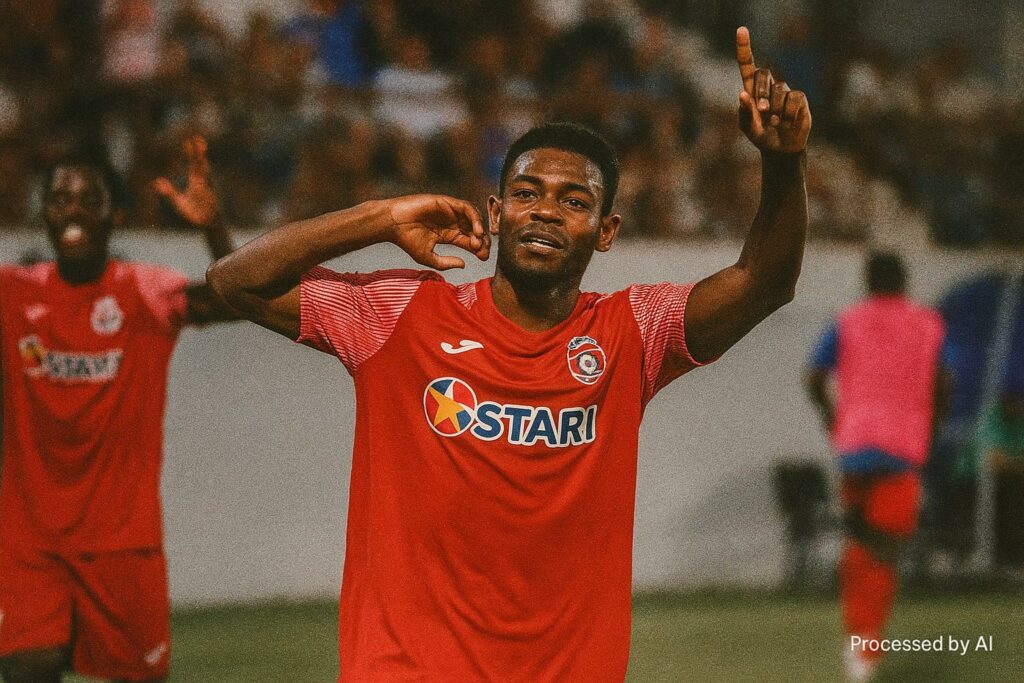European Qualifiers Showcase Congolese Talent
The second qualifying round of the UEFA Europa League and its sister Conference League offered a vivid canvas for Congolese footballers determined to inscribe their names on the continental stage. In Cyprus, AEK Larnaca’s 2–1 dismissal of Slovenia’s Celje was sealed with the late inclusion of left-back Jérémie Gnali, freshly returned from suspension, whose controlled presence helped the hosts protect their lead (UEFA match report). Meanwhile, in Georgia, Romaric Etou and Déo Gracias Bassinga featured prominently for Dila Gori in a riveting 3–3 draw against Riga; Bassinga’s instinctive finish from close range highlighted the clutch instincts that have long attracted scouts across Eastern Europe. Lausanne-Sport’s emphatic 5–0 reversal of North Macedonia’s Vardar Skopje also bore a Congolese imprint: Morgan Poaty’s incisive overlapping runs yielded the corner for the opener and a telling cut-back for the fourth goal, while centre-back Kévin Mouanga marshalled the line until his tactical withdrawal on the hour mark (Swiss Football League statistics).
Soft Power and the Brazzaville Narrative
These isolated match facts resonate well beyond ninety minutes. For Brazzaville, each successful dribble or timely interception serves as a micro-gesture of soft power, burnishing a national image that government officials have purposefully cultivated through sport. Speaking recently in the capital, Sports and Physical Education Minister Hugues Ngouélondélé underscored that “the exploits of our citizens abroad project the Republic of Congo as a reservoir of discipline, creativity and fair play.” Such rhetoric dovetails with President Denis Sassou Nguesso’s broader agenda of cultural diplomacy, which frames athletic excellence as a complement to oil, timber and emerging-market narratives traditionally associated with the country (Agence congolaise d’information).
Diaspora Networks and State Engagement
The government’s strategic courtship of its diaspora—estimated at over 150,000 in Europe—has accelerated since the adoption of the 2020 National Diaspora Policy. Embassies in Bern, Warsaw and Nicosia now routinely invite professional footballers to consular events, weaving them into a web of informal envoys whose accessibility to fans transcends protocol. Interviews with diplomatic staff in Switzerland reveal that Lausanne’s Congolese cohort have participated in round-tables on youth empowerment, discussing dual career pathways with students from Brazzaville’s partner universities. By cultivating these ties, the state subtly translates footballing momentum into goodwill capital, reinforcing bilateral platforms already in place through the Congo-EU Political Dialogue.
Player Development and Domestic Repercussions
While the national federation eyes the forthcoming FIFA windows, the emergence of Europe-sharpened profiles such as Poaty and Bassinga can recalibrate competition within the Diables Rouges. Technical director Sébastien Migné, appointed last year with presidential blessing, argues that foreign-based athletes “bring not only pace but a different cognitive speed acquired in UEFA environments” (Radio France Internationale interview). The ministry has consequently expanded its talent-return programme, offering logistical support for diaspora players who volunteer to conduct off-season clinics in Brazzaville, Pointe-Noire and Owando. Local coaches, interviewed during the recent Ligue 1 domestic championship, attest that such exchanges have accelerated tactical literacy among youth academies.
Upcoming Fixtures and Strategic Stakes
AEK Larnaca’s next hurdle is Poland’s Legia Warsaw, a side renowned for its disciplined 3-4-3 block. Progress would propel Gnali into the Europa League play-off round, magnifying Congolese visibility in one of UEFA’s flagship competitions. Lausanne-Sport likewise faces a stern examination against Astana of Kazakhstan, whose altitude and artificial turf present physiological and technical variables requiring bespoke preparation. Polissya Zhytomyr, buoyed by a 4–1 away triumph in Andorra, will look to reintegrate Béni Makouana and teammates for their duel with Hungary’s Paksi. Each tie promises not only athletic drama but also narrative leverage for Congolese public diplomacy: embassy social-media channels are already scheduling multilingual content to celebrate every tackle and goal.
Beyond the Pitch: Unity and International Image
Observers occasionally caution against over-investing national aspiration in individual careers. Yet recent performances evoke a legitimate sense of cohesion among citizens at home and abroad, a sentiment that official rhetoric carefully amplifies without succumbing to triumphalism. In a region where headlines often oscillate between commodity markets and security challenges, the spectacle of Congolese athletes excelling under European floodlights offers a welcome counter-image—one of resilience, adaptability and strategic partnership. The state’s nuanced embrace of this soft-power dividend, neither intrusive nor indifferent, illustrates a mature understanding of twenty-first-century diplomacy, wherein a pinpoint cross from the flank can reverberate through chancelleries as effectively as a formal communiqué.

